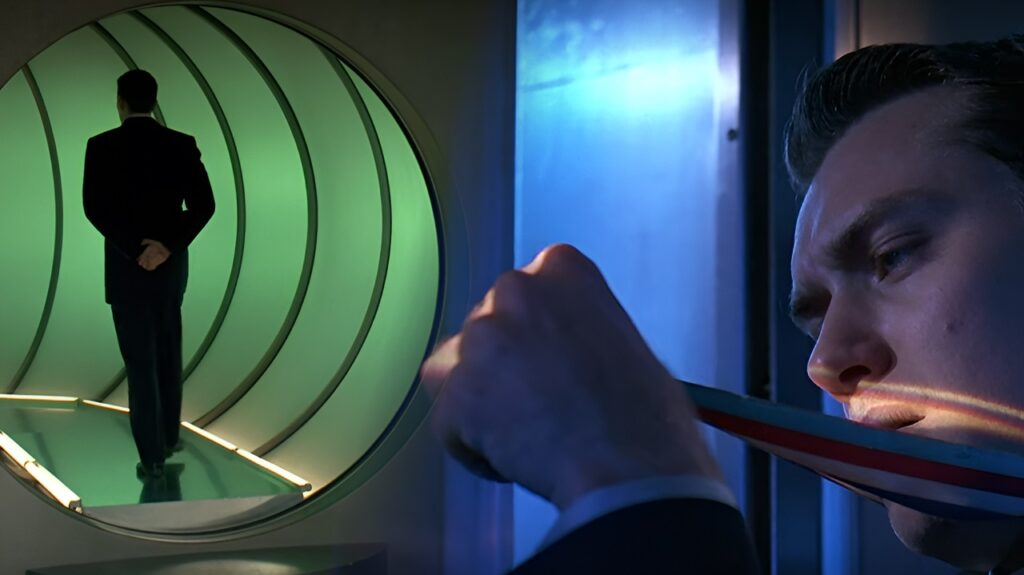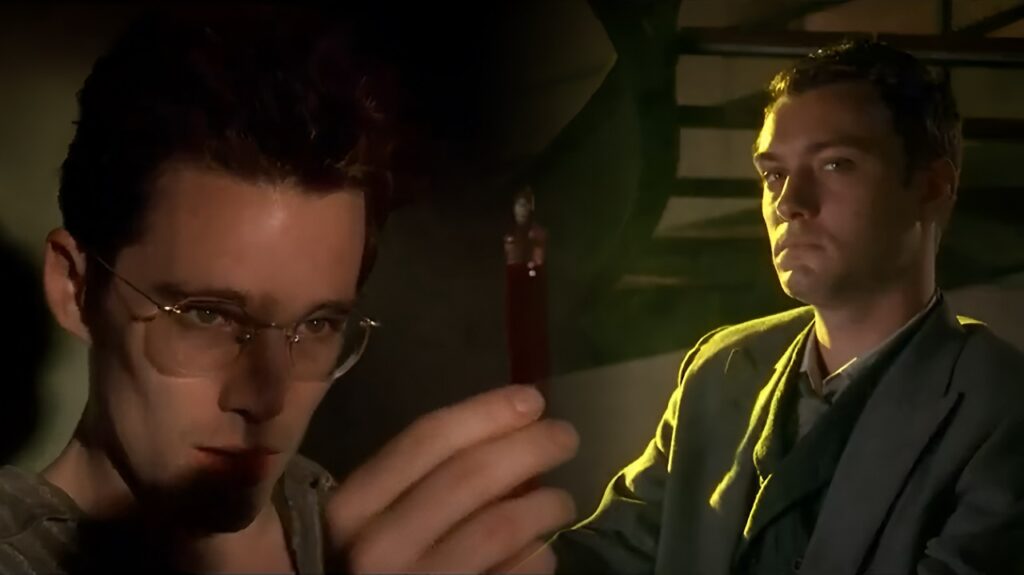This post includes a brief plot explanation, an analysis and a review of the 1997 film “Gattaca”. Beware of spoilers.
Imagine a society where your worth is measured not by your actions or character but by the perfection of your genes. How far would you go to chase your dreams in a world that has already written you off?
“Gattaca”, directed by Andrew Niccol, thrusts us into this unsettling future, where genetic discrimination is the norm and free will is a luxury. Its stellar cast includes Ethan Hawke, Jude Law and Uma Thurman. The 1997 sci-fi forces the audience to confront uncomfortable truths about human potential and societal prejudice.
In the film “Gattaca”, a man named Vincent is determined to change his fate. He is willing to do and risk everything to pursue his dream.
Somewhere in the near future, people’s fates will be determined by their genetics. Our protagonist, Vincent, is considered an “in-valid” because he is not genetically perfect. His parents made him naturally, but that would eventually become a costly decision for them and for Vincent.
Although Vincent has big dreams of venturing into the space travel field, he will never make it. At least not as himself. So, Vincent decides to “buy” a new identity: Jerome Eugene Morrow, a man who was born with superior genes.
There is a reason why Jerome is willing to sell his precious identity: he has become paraplegic after a car accident. Now with this new identity, Vincent can finally let go of his job as a janitor at the space travel institute “Gattaca” and officially enrol in their program as a candidate.
Just when everything was going smoothly for Vincent, a murder happens in “Gattaca”. The incident almost exposes Vincent’s true identity. During the police’s investigation, Vincent reconnects with his brother Anton, who is the detective at the case. Meanwhile, Vincent also experiences love for a fellow colleague, Irene Cassini.
The murderer turned out to be Vincent’s supervisor, the mission director. He killed the victim for trying to sabotage his mission. Before the launch, Vincent takes a final genetic test. Dr. Lamar, who oversees the test, admits he knows about Vincent’s secret but allows him to pass.
Before taking his life away, Jerome provided Vincent with years of genetic samples. The film ends with Vincent successfully onboarding the spacecraft and reading the note that Jerome left for him. Despite his ambiguous fate, Vincent looks back at Earth with no regrets.
“Gattaca” is about the resilience of the human spirit when in pursuit of a dream and it serves as a strong reminder about the dangers of discrimination based on physical attributes.
Despite his shortcomings, Vincent didn’t let his family or society stop him from trying to pursue his dream of going to space. Unlike many of the perfectly engineered people in this dystopian future, Vincent went above and beyond to achieve his ultimate goal.
Aside from “faking” his genetic material, everything is real about Vincent’s achievements. This man earned his spot in the mission to Titan, no one gifted nor handed it to him.
Instead of solely relying on his genetics, Vincent went above and beyond to be on par with his fellow colleagues. As a matter of fact, Vincent exceeded the standards because not everyone on Gattaca can or will onboard on a mission.
Having said that, eugenics is not a perfect system. It leaves out people without giving them a fair chance to prove themselves.
There are a lot of parallels between the dystopian future portrayed in the film and the real-life world.
Ironically, in this case, eugenics seems to limit people rather than taking humanity one step further. In other words, eugenics sounds like a more sophisticated form of racism or another type of discrimination based on physical attributes.
Vincent is a diligent and determined individual. But because of his genetic imperfections, the dystopian society ruled by eugenics completely “wrote him off”. Although Vincent wasn’t built for physically demanding jobs, he definitely has more potential than working his entire life as a janitor.
Then there is Jerome, someone who had everything but decided to give up. As the story unravels, Jerome makes a shocking revelation to Vincent: the car accident paralysed Jerome, but he was the one who intentionally stood in front of it.
So why did Jerome sabotage himself? Well, there is the curse of being born perfect and the expectations that come with it. On paper, Jerome is a perfect specimen, but whenever he fails to achieve first place, he doesn’t know how to cope with the disappointment.
However, what Jerome fails to understand is that when he is competing with other perfectly engineered people, he won’t always get first place. When talking about “la crème de la crème”, there are very small differences among them. Ultimately, it will be “luck” or another uncontrollable variable that will determine their success.
Last but not least, there is Irene, who is almost “perfect”. Genetics wise, Irene is a bit “luckier” than Vincent, but not as lucky as Jerome. Just like Vincent, Irene also has a heart condition. It’s not as severe as Vincent’s, that’s why she was able to get into Gattaca. But there is a cap in terms of how much she can progress there.
Irene’s career limitation based on health can be compared to the glass ceiling phenomenon that happens in real life inside certain corporate environments. In our current society, this happens mostly to women and minorities. Irene is good enough to get into Gattaca, but she’ll never be able to embark on a mission to Titan (the top).

Gattaca reaches its climax with Jerome’s death and Vincent’s uncertain fate.
The ending of Gattaca shows Vincent in space feeling nostalgic about his days on Earth and Jerome leaving the world on his own terms. Andrew Niccol didn’t give the audience what they wanted, he gave them what they needed.
On one hand, it was sad to watch Jerome take his own life. But on the other hand, it was liberating to watch Vincent finally achieve his ultimate goal: travel to space.
Even though Jerome decided to die, he left on his own terms. In a way, he got to experience having a dream again through Vincent. Also, he really wanted Vincent to continue to live a good life. Before parting, Jerome left years of DNA so Vincent could keep using his identity. And he didn’t tell him about his plans, so the latter could embark on his mission without any worries.
The film doesn’t give much away about what’s going to happen to Vincent. He might die during his mission because of his heart condition, but he might also make it back to Earth. Who knows? After all, Vincent surpassed the life expectancy that doctors estimated for him.
Final Thoughts
Overall, “Gattaca” is an amazing film. Although it’s labelled as a sci-fi film, it has a simple storyline that doesn’t rely too much on special effects or other aesthetic gimmicks to make it work.
If there is a message that can be taken from “Gattaca” it would be the following: “Do not let your current shortcomings dictate your future”.
Many of us might feel hindered by what we do not possess or think that we need to have to succeed. But in reality, very few were born with a silver spoon and many just have to figure out how to materialize their dreams.
Acting-wise, Ethan Hawke delivered a solid performance, which was already expected. But it was Jude Law who completely stole the show as Jerome Morrow. He perfectly captured the burden of someone who is expected to be the best in everything, simply because he was “designed” for that purpose.
Although “Gattaca” was released in 1997, it still feels very “fresh” and relevant. Personally, I believe that maybe it was a bit ahead for its time, hence why it was poorly received in the 90s. Nevertheless, watching it during a time characterized by economic uncertainty and political instability makes “Gattaca” even more relatable and impactful.
Final Thoughts: 




